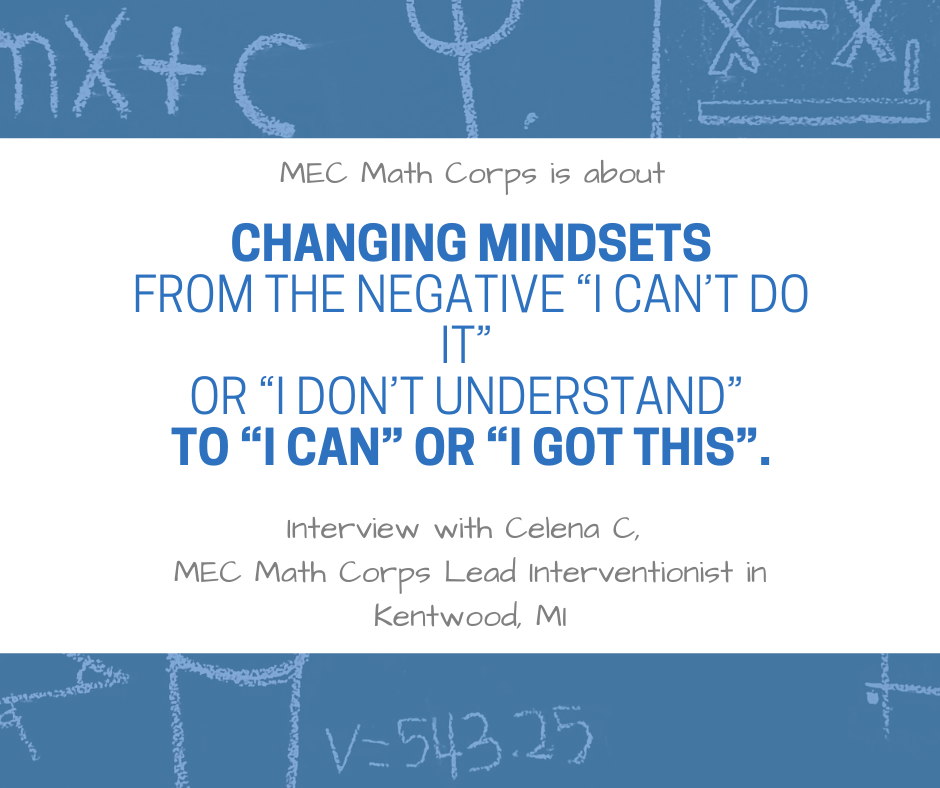
Gaining Skills and Giving Back: Interview with Celena Cho, MEC Math Corps Lead Interventionist
Gaining Skills and Giving Back
Interview with Celena Cho, MEC Math Corps Lead Interventionist
Celena is an MSU alum with degrees in sociology and psychology. She is in her second service term as an MEC Math Corps Interventionist placed at Discovery Elementary in Kentwood, MI, which is also her hometown. She is considering a career in education, specifically as an Interventionist.
Q: What led you to serve with MEC Math Corps, and why have you chosen to continue serving?
A: As a senior in college, I had changed my career path. I had no idea what I would do going forward, but towards the end of the year I had an inkling that I might want to go into higher education. Nothing was for certain and the program I wanted to try didn’t pan out, so after graduating, I ended up getting a job in senior care. After a few years, I needed a change of pace. I looked on Indeed last year and stumbled upon Michigan Education Corps’ listing. I thought it was a sign so I applied, interviewed, and was selected to start my service term in January 2020. I chose to return to serve this school year because I felt a bit cheated out of my last term because of Covid-19. I want to see if this is something I want to pursue even after I’m done with MEC and I want to give back to the community that gave so much to me in the first place.
Q: Do you really have to be a “math person” to be an MEC Math Corps Interventionist? How has training and coaching helped to support you?
A: Oddly enough, no, you do not need to be a “MATH” person to be an MEC Math Corps interventionist. Honestly, the way they teach math now is different from when I learned it. It’s actually better to come in with a “blank slate”, because it’s easier to learn how the students learn how to solve problems. You can include your own strategies and give other ways to solve problems. The training gave me the tools to help students succeed. It taught me new strategies and gave evidence-based data to prove its effectiveness.
Q: What does your typical day look like? What is the best part of your day?
A: A typical day starts with planning for the sessions for the day. I start by checking to see which groups I’ll be taking, verifying which unit and lesson each group is on, and gathering materials. When groups start we either start off with a game or fast math to help their fact fluency, then we get to learning new material. I take about 7 groups of 2-3 students for 30 minutes per day. I meet with each group 3 times a week at different times. In response to the pandemic, I have to take extra precautions and disinfect materials and work spaces between each session. At the end of the day, I spend time entering data into the tutoring logs. I serve a total of 7-8 hours per day at the school.
Q: How do you get kids excited about math?
A: We play games and ignite their competitive spirits. I also reassure my students that it’s ok to not know things right away, the point is to try to solve the problem. I give more incentives by adding a sticker and candy reward system and address other issues that could make math harder for them. I make sure that I stay excited and speak animatedly. We take mini breaks when needed.
Q: How has the pandemic impacted your day to day service?
A: It impacts the number of students I can see. Between each group of students, I disinfect surfaces and materials. Teacher schedules are also more rigid because they have the same core classes around the same time which makes it harder to schedule kids in for their 90 minutes per week. Having to wear a mask can make it harder to hear/understand students. We have to be flexible and adaptable to the circumstances to keep everyone healthy.
Q: What is one thing that you want people to know about being a Math Corps Interventionist that they might not know?
A: You go in thinking it’s all about teaching them math skills, but you learn its more than that. A big portion of your service will actually be spent getting the students confident in their abilities. Changing mindsets from the negative “I can’t do it” or “I don’t understand” to “I can” or “I got this”. You reinforce that it is alright to not know something and that it is alright to ask for help. Just because something is a little trickier for them and not others doesn’t mean they won’t ever understand it.
Q: Is there anything else you want to share about your service experience?
A: I’m sad that my 1st service term was interrupted by school closures and I’m excited to get a full year with these students. It may be overwhelming at first, but it is a great and rewarding experience. I will truly enjoy watching these students bloom and come into their own over the course of the school year. I can only hope that this leaves a strong enough impact to help them succeed later in life. This is a wonderful experience that teaches skills you’d be hard pressed to gain anywhere else.






